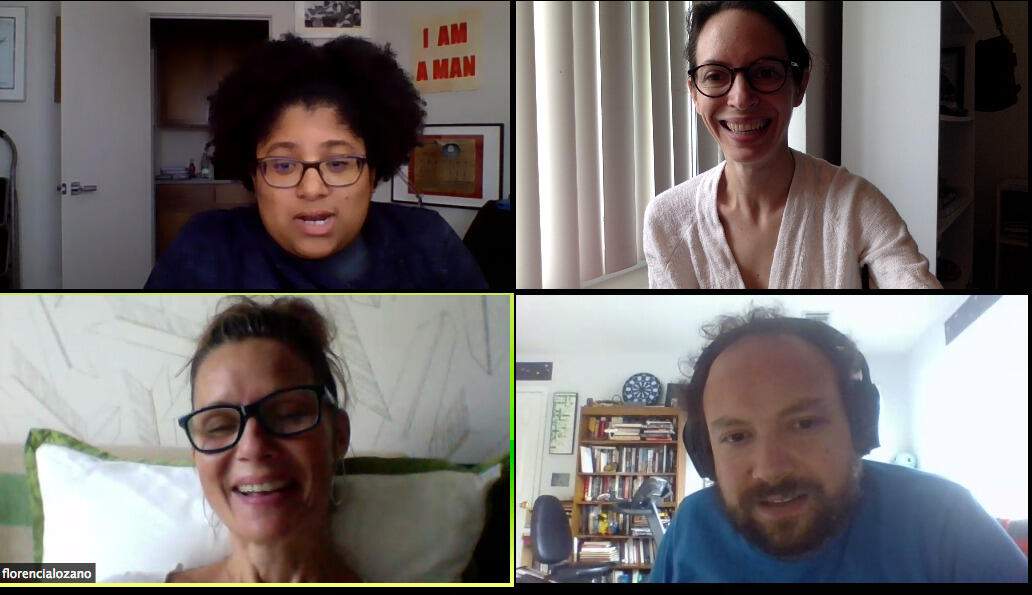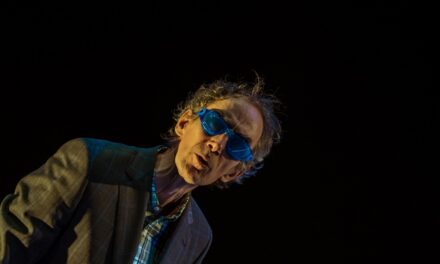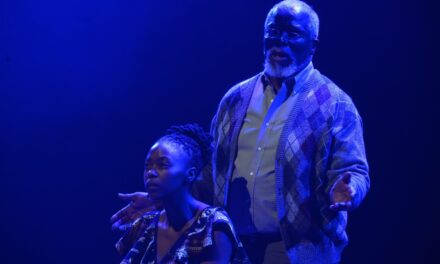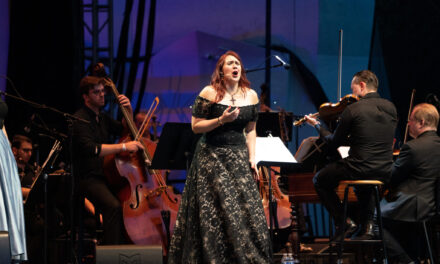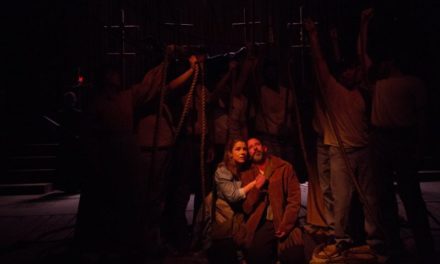The last several decades of U.S. history have seen a remarkable upswing in women’s political success, with female candidates rising to prominence in Congress, the Supreme Court, and the Vice Presidency itself. However, America still has yet to see a female president, and the stories of the women who tried, and failed, to rise to this rank are as varied and complex as the political landscapes they navigated. A Simple Herstory, Jocelyn Kuritsky’s theatrical podcast series, offers an astute and clever look at these women, as well as our own tendency to glorify, defame, or mythologize their pursuit of the nation’s highest office.
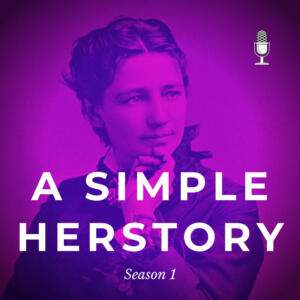
Produced by The Muse Project and presented as part of The Tank NYC’s Cybertank digital programming series, the show’s first season follows an anonymous host (Kara Young) in her efforts to create an inspirational “quick hits look” podcast profiling female presidential candidates throughout the ages. Under the combined pressures of philanthropic funding and limited studio time, the Host begins this endeavor with a look at Victoria Woodhull, whose 1872 presidential candidacy marked the first instance of a woman running for the office, at a time before women could even vote. It soon becomes clear that her attempts to define Victoria will not come easily: at once a stockbroker and Marxist, journalist and faith healer, Eugenicist with a Black running mate and erstwhile proponent of the free love and suffrage movements that disavowed her, Victoria proves to be a figure as contradictory as the America in which she lived. The Host’s efforts are further compounded when Victoria’s spirit (Florencia Lozano) materializes, taking over the mic and demanding to be presented in her full, flawed glory. Shaken but undeterred, the Host presses onward, dogged by the ghosts of Victoria and her contemporaries as she seeks to understand both the woman herself and the larger question of why she, or any female candidate, would run.
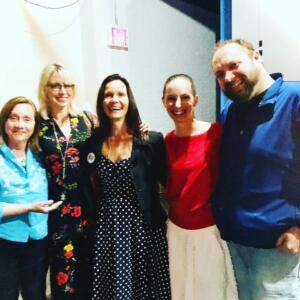
Dale Soules, Jenny Turner Hall, Florencia Lozano, Jocelyn Kuritsky, Jonathan A. Goldberg at A Simple Herstory kickoff at The Tank
Each of the season’s eight episodes presents a new facet of Victoria’s story, as the Host experiments with different angles, styles, and formats through which to understand her complicated muse. Reporter-on-the-street interviews with Victoria’s family, friends, and enemies, from the workers she inspired to the moral crusaders who reviled her; the patrons who funded her spiritualist pursuits and the con-man father (Dale Soules) who profited from them; and the industrialists and activists she alternately bedded, betrayed, and blackmailed, offer little clarity but emphasize the biases which skew our perceptions–and ballots. An NPR-style sequence in which the Host and a singer-songwriter (Danielle Ferland) try to update Victoria’s problematic campaign song (“make it smart, but not too smart; approachable but professional, [maternal] but not…nagging; but have fun with it!”) lampoons the impossible standards asked of historians and female leaders alike. Accounts of the era’s daily realities highlight the squalor, violence, misogyny, and class warfare surrounding Victoria’s run, and a zany dating-game look at her three husbands (Yetta Gottesman, Socorro Santiago & Rebecca Atkinson-Lord) belies the darker underbelly of abuse and oppression that led her to seek empowerment through free love. Stage-play dramatizations of Victoria’s interactions with such figures as Wall Street tycoon Cornelius Vanderbilt (Ching Valdes-Aran), suffragettes Susan B. Anthony and Elizabeth Cady Staton (Rachel Crowl; Kate Burton), and her unofficial running mate Frederick Douglass (Donnetta Lavinia Grays) fail to capture the totality of her narrative, while an extended dialogue with Victoria’s sister Tennessee “Tennie” Clafflin (Daphne Rubin-Vega) casts a cynical eye on our collective hero-worship and belief in historical progress. Torn between countless failures and a burning need for answers, the Host must ultimately question whether the individuals and structures in which we cast our faith can, for all their faults, still hold value.
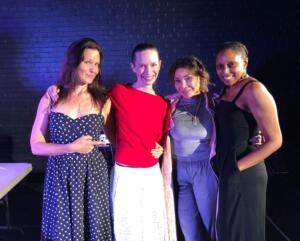
Florencia Lozano, Jocelyn Kuritsky, Daphne Rubin-Vega, Erin Cherry at A Simple Herstory kickoff at The Tank
Merging historical fact, sly humor, and existential query, A Simple Herstory packs ample substance into each brisk episode. The Host’s search for meaning, struggle to bridge myth and reality, and attempts to neatly distill a checkered subject are as familiar as they are comic, and progressive-leaning listeners will empathize with her idealism and disillusion. Unapologetic but no less relatable, Lozano’s Victoria owns her self-serving choices as much as the corrupt circumstances which fueled them. Likewise, each member of the ensemble cast literally and figuratively speaks to human folly in equally-flawed times, and to the vicious cycles behind every seeming leap forward. As such, the podcast gives a smart and nuanced look into our relationship to the past, and warns against our capacity to turn ordinary people into saints, villains, or object lessons. Individuals’ and nations’ histories are rarely simple, but that, the show maintains, is the point: in our efforts to understand a person, time, country, or system, we can never know the full story, let alone roundly reconcile it. We must, as Victoria urges, embrace all of what we receive, interpret it as we will, and take whatever serves us best.
This post was written by the author in their personal capacity.The opinions expressed in this article are the author’s own and do not reflect the view of The Theatre Times, their staff or collaborators.
This post was written by Emily Cordes.
The views expressed here belong to the author and do not necessarily reflect our views and opinions.

